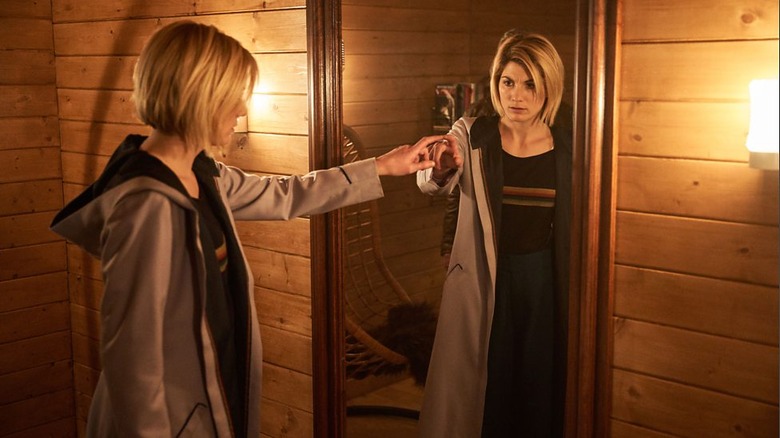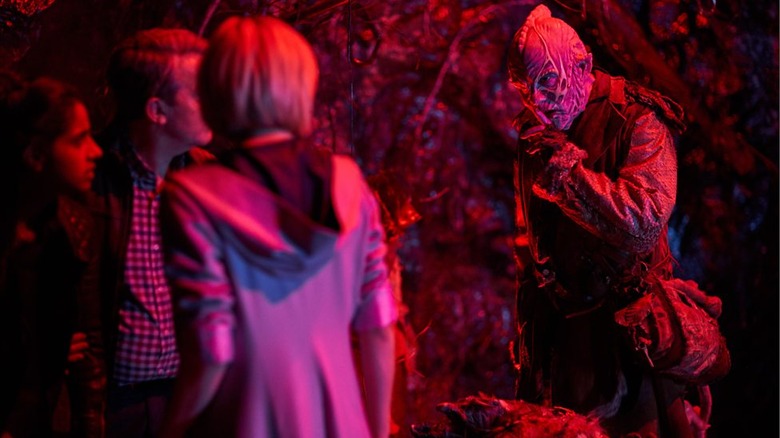'It Takes You Away' Leap-Frogs To The Top Of 'Doctor Who's Best, Weirdest Episodes
Doctor Who has always been the weird, ugly stepchild of sleek, high-concept sci-fi shows. The show frequently nails a unique mixture of heart and camp, more so than the cerebral kind of sci-fi that frequently appeared on high-concept series like The Twilight Zone. But now and then, every once in a very long while, every day in a million days, Doctor Who gets downright surreal. And one of those days was last night with the ninth episode of season 11, "It Takes You Away."
A Grimm fairy tale meets Greek myth meets Solaris, "It Takes You Away" may one of the most cerebral, weird episodes of Doctor Who I've ever seen — and at the very least a season best, if not a series best, for the show.
Mirror, Mirror
The episode begins as many fairy tales — or horror movies — do: with a cabin in the woods. The Doctor, Yaz, Ryan, and Graham find themselves by a serene fjord in present-day Norway, but soon discover something much more sinister at play when they notice a frightened child barricaded in an isolated cabin. Investigating the heavily barricaded and locked cabin, they find Hanne (Ellie Wallwork), a young blind girl cowering in the closet. Her father Erik has been missing for four days, but Hanne has been paralyzed by fear of an unknown "thing" in the woods. "It takes you away," she whispers in fright.
Team TARDIS jump to investigate the strange situation, except for Ryan, who skeptically suggests that Hanne was abandoned by her father. But he's soon proven wrong when they hear a roar outside and a strange piercing sound coming from her dad's bedroom. Now here I was ready to assume that this would be a straight-up horror episode of Doctor Who — the cabin, the monster, the frightened blind girl all scream an eerie home invasion story, or even a riff off of the unnerving It Comes At Night if the show wanted to get really crazy. But "It Takes You Away" took me to places that even I didn't expect.
Team TARDIS discover a mirror in Hanne's dad's bedroom that has been transformed into some sort of interdimensional portal, and naturally, jump headfirst to investigate. All except, again, for Ryan, who is left behind to look after the frustrated Hanne. In a rather dark moment for the series, the Doctor writes a message on a wall for him that Hanne can't see, telling him to assume that her dad is dead. It's a quick character moment, but an essential one for us to piece together the Doctor's still-in flux personality. Jodie Whittaker has established herself as a vibrant, luminous figure of course, but we're nearing the end of her first season and I'm still not totally sure who her Doctor is. "It Takes You Away" may give us the best idea yet, and solidifies her Doctor's realist, slightly ruthless, but still welcoming character.
The Red Thread of Fate
There's a myth in Chinese and Japanese cultures of a "red thread of fate" that ties together two people who are destined to meet. But in Western culture, a red thread calls to mind the myth of Theseus and the Minotaur, and Ariadne's red string that leads the mythical king out of a labyrinth. In "It Takes You Away," a little bit of both are at play.
The Doctor, Yaz, and Graham end up in a labyrinthine cavern, where they stumble upon an alien plucking a bird under a balloon-like red lantern. A guide? An enemy? This Gollum-like creature, named Ribbons, walks a tightrope between both roles — offering to take them to Erik in exchange for the Doctor's sonic, though not before the Doctor threatens him with it after he takes a knife to Graham's throat. Distrustful of Ribbons, the Doctor ties a rope to her waist so as to not get lost, though that rope is soon cut by Ribbons when the group is distracted by creepy "flesh moths" that are attracted to the lantern and — you guessed it — human and alien flesh. But once the flesh moths come out in swarms, a panicked Ribbons finally reveals to the Doctor that they're in an "antizone," eliciting a similar distressed reaction from the Doctor who explains that it's a sort of protective buffer zone formed when space-time is threatened. Ribbons is eaten alive by the flesh moths, but Team TARDIS escapes through a portal to another dimension that oddly looks just like the house they just left. The myth of Theseus gives way to a riff off of Coraline, as the group discovers that Erik has been living in this bright, uncanny version of his house with his long-dead wife Trina.
A Grimm Solaris
Meanwhile in our world, Ryan discovers that the roaring noise was coming from a speaker outside a house that was planted by Erik. But as he runs back inside to inform Hanne, she knocks him out and steals the key to her father's bedroom to head into the portal. Using the rope as her guide, Hanne finds her way through the cavern until the thread ends at the spot where Ribbons' corpse lies. Ryan soon catches up with her, but not before another flesh moth ominously lands on Ribbons' still-glowing lamp.
Back in the Coraline-verse, Team TARDIS are attempting to convince Erik to return to his daughter, but he refuses, and soon the fam faces a temptation of their own with the appearance of Grace (Sharon D. Clarke), who had died in the first episode of this season. It's a powerful moment for Graham, who has spent the majority of this season in mourning, and whose desperate hope upon seeing her is palpable. But this lights the alarms in the Doctor's head, who goes off with Yaz to recount an old bedtime story. A myth told to her by one of her seven grandmothers ("Granny Five was my favorite") chronicled the story of the "Solitract," a great consciousness that prevented the birth of the universe until it was exiled into another plane of existence. The Doctor realizes that this alternate dimension is this long-lost consciousness (nicely summed up by Yaz as "a separate exiled consciousness that is also a universe") that has set up a trap to ensnare vulnerable humans like Erik and Graham. This episode has already been chock full of inspirations, but this is where "It Takes You Away" steps onto a higher plane (pun intended) with a storyline that recalls Stanis?aw Lem's Solaris, which follows humans who are confronted with manifestations of their greatest sources of guilt by a sentient planet.
But not one just to get philosophical, Doctor Who has to make it weird. The moment when the sentient universe turns into a talking frog is one of the truly strangest moments on Doctor Who, a show that has played Britney Spears' "Toxic" at a party celebrating the burning of the Earth. The Solitract, which has turned into a frog because the form "gives it endless joy," has taken on the form to talk to the Doctor once it had expelled everyone else following the Doctor's persuasive argument. The heartbroken Erik and Graham are the last to leave, leaving the Doctor alone in a heavenly white room with the talking frog that begs her to teach it about the universe. "I miss you, I miss it all so much," it sadly pleads. But the Doctor can't stay, she says, or they'll both die. She persuades the Solitract to let her leave by promising that they'll be friends forever and the Solitract agrees, telling her, "I will dream of you our there without me."
Writers Ed Hime and Joy Wilkinson have crafted a fairy tale story that blends all of this and more, in a bizarre and lofty episode the likes of which Doctor Who has rarely done before. Oh sure, there have been ambitious episodes like "Silence in the Library," "Turn Left," and even Neil Gaiman's somewhat similar "The Doctor's Wife," but rarely is there an episode in this series that so potently tackles such a high concept with such a powerful emotional center.
Tidbits in Time and Space




